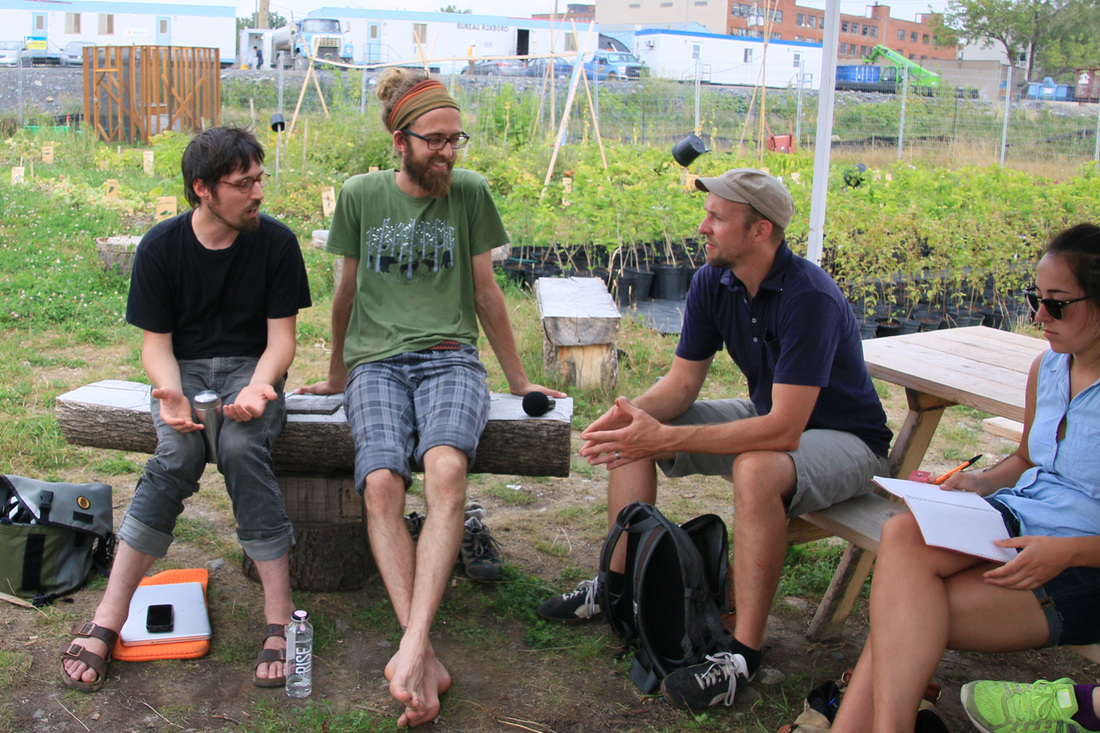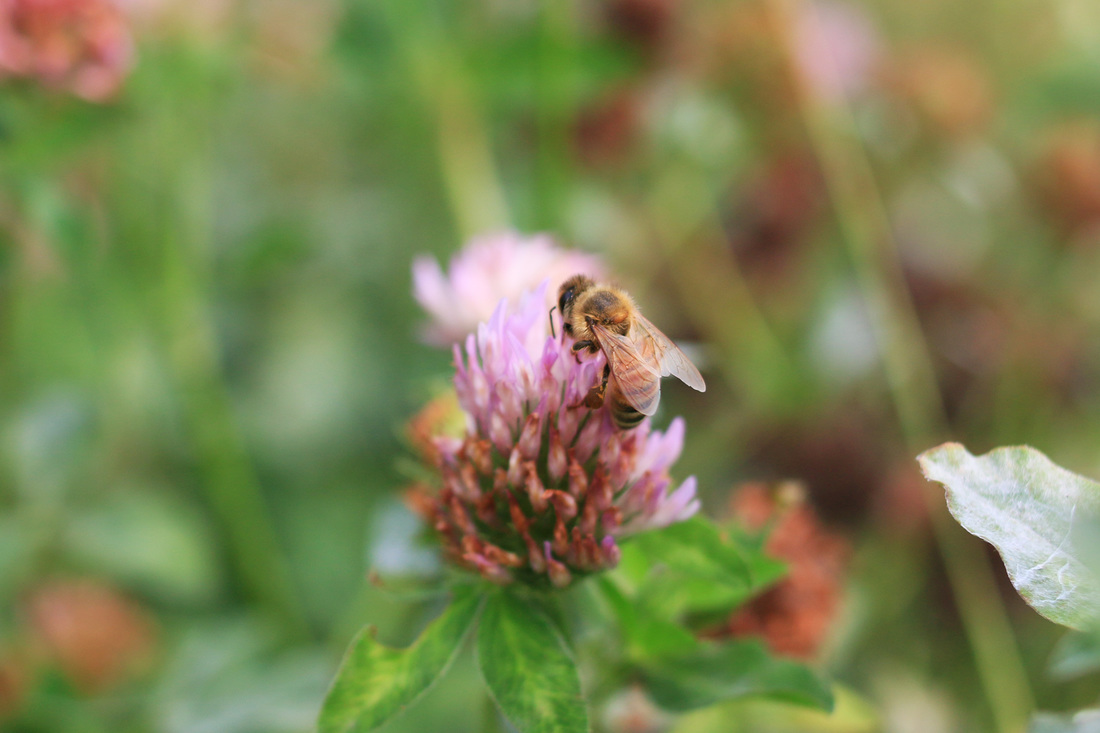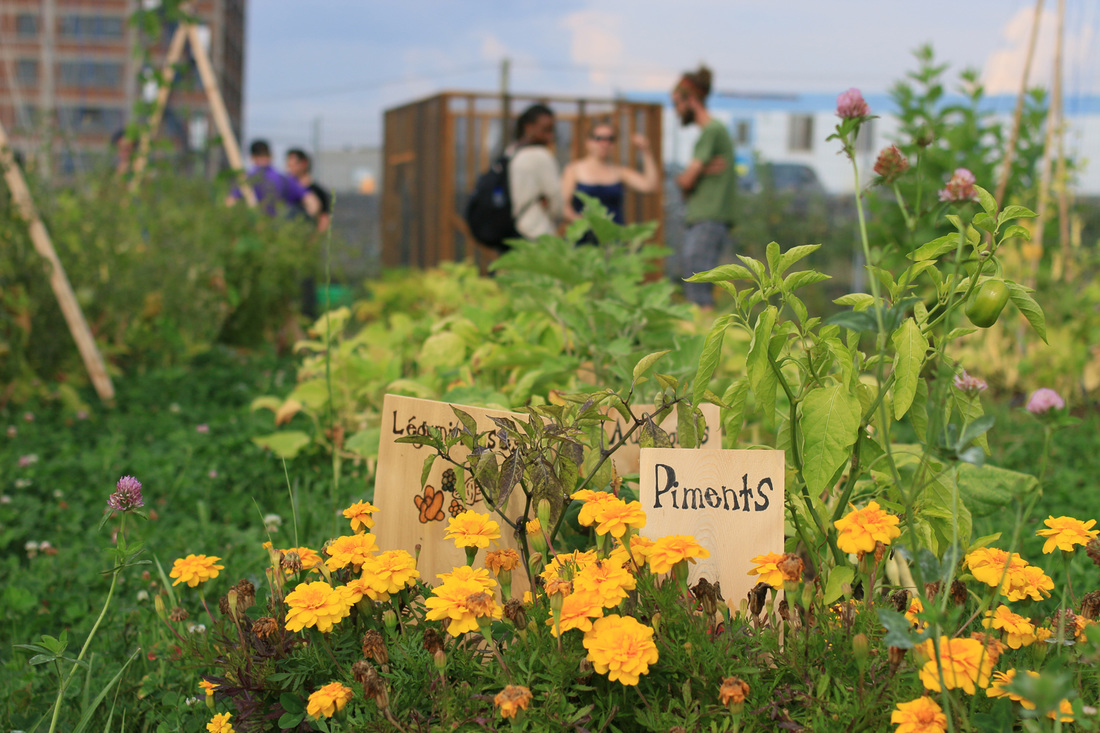This afternoon, we split up into two groups to visit beekeepers with both different models of beekeeping and different organizational models. Alvéole is a business that employs ten people who have set up 400 beehives at 150 locations, including homeowners, schools, companies and a homeless shelter. They train clients to maintain the hives through bi-monthly, on-site training. Their program is more focused on education rather than maximizing honey production, but clients do harvest and distribute their honey among members, students or employees.
Miel Montréal is a not-for-profit collective and educational service for aspiring beekeepers and schools. They teach people about the role of bees as pollinators; collective decision-making and processes are also part of their educational platform. Miel Montréal helps keep 35 hives, has at least one paid staff and up to fifteen part-time paid staff in the summer; they also rely heavily on collective members who volunteer their time to sell honey or take responsibility for administrative tasks.
Miel Montréal is a not-for-profit collective and educational service for aspiring beekeepers and schools. They teach people about the role of bees as pollinators; collective decision-making and processes are also part of their educational platform. Miel Montréal helps keep 35 hives, has at least one paid staff and up to fifteen part-time paid staff in the summer; they also rely heavily on collective members who volunteer their time to sell honey or take responsibility for administrative tasks.
One of the issues that we explored in both groups, each of which had their own framing, was the idea of an urban commons (our lens) from which privately kept bees must feed in order to produce honey. The city has only so many flowers whose nectar bees drink, which puts an environmental limit on the amount of honey that can be produced no matter how many hives exist. Plus, bees compete with other native pollinators that also depend on the nectar of the city’s flowers.
Alvéole says that so far, they’ve seen no issue with the current quantity of beehives; no limits to honey production have been observed with the current number of hives in Montreal. Limiting the number of hives should not be the focus of policy, Alvéole argues. Instead, the issue is about expanding the flower supply in the city, which urban gardens are already doing. There is room for more nectar. School boards have a policy on the books prohibiting flower planting and fruit trees; changing this policy could allow more space for pollinators. Alvéole has also promoted a policy with the city parks they call “the two-week challenge”. Montreal’s parks fill with clover and dandelion in the spring, but often get immediately mowed over by the City; if the City would leave these parks for two weeks, lots more nectar would be available for bees.
Alvéole says that so far, they’ve seen no issue with the current quantity of beehives; no limits to honey production have been observed with the current number of hives in Montreal. Limiting the number of hives should not be the focus of policy, Alvéole argues. Instead, the issue is about expanding the flower supply in the city, which urban gardens are already doing. There is room for more nectar. School boards have a policy on the books prohibiting flower planting and fruit trees; changing this policy could allow more space for pollinators. Alvéole has also promoted a policy with the city parks they call “the two-week challenge”. Montreal’s parks fill with clover and dandelion in the spring, but often get immediately mowed over by the City; if the City would leave these parks for two weeks, lots more nectar would be available for bees.
Miel Montréal has a somewhat different approach to both beekeeping and managing an urban commons. They focus on two principles—that of frugality and that of precaution. Frugality means limiting human honey consumption. One thing the collective teaches its students is that over its lifetime, one bee produces one-eighth of a teaspoon. Humans consume honey in ways that demand industrial-scale production and without an awareness of natural processes.
Here, the precautionary principle invoked by the collective means waiting for more research on the effect on existing pollinators before pursuing an expansion of urban beehives and honey production. They also focus on a broader understanding of the ecological system of the city. Miel Montréal teaches that simply having more beehives in the city or having a beehive in your backyard does not help to stop colony collapse. Instead, we should be trying to understand the factors that contribute to collapse. They make an analogy to elephants in Africa that are dying off. Raising elephants elsewhere is clearly not the solution; instead understanding and addressing the real factors that are contributing to extinction is the crucial point. They stress the importance of a more comprehensive understanding of the plight of bees.
So far, policies governing urban beekeeping do not fully contemplate the idea of an urban commons. As planning, policy, and practice in urban agriculture evolves, it is important to see how this idea is conceptualized and operationalized by different, and even competing, models of beekeeping.
-Diana and Dillon
Here, the precautionary principle invoked by the collective means waiting for more research on the effect on existing pollinators before pursuing an expansion of urban beehives and honey production. They also focus on a broader understanding of the ecological system of the city. Miel Montréal teaches that simply having more beehives in the city or having a beehive in your backyard does not help to stop colony collapse. Instead, we should be trying to understand the factors that contribute to collapse. They make an analogy to elephants in Africa that are dying off. Raising elephants elsewhere is clearly not the solution; instead understanding and addressing the real factors that are contributing to extinction is the crucial point. They stress the importance of a more comprehensive understanding of the plight of bees.
So far, policies governing urban beekeeping do not fully contemplate the idea of an urban commons. As planning, policy, and practice in urban agriculture evolves, it is important to see how this idea is conceptualized and operationalized by different, and even competing, models of beekeeping.
-Diana and Dillon



 RSS Feed
RSS Feed
